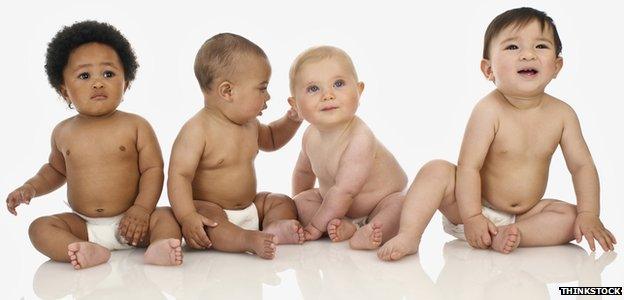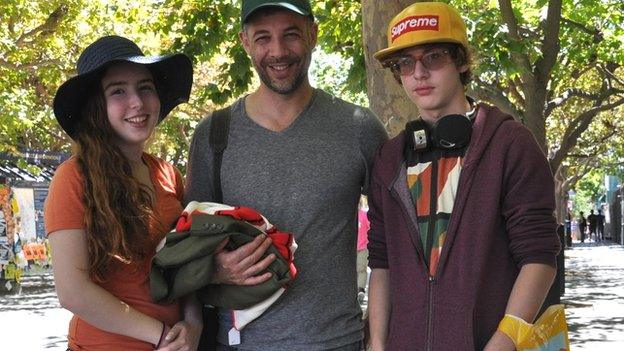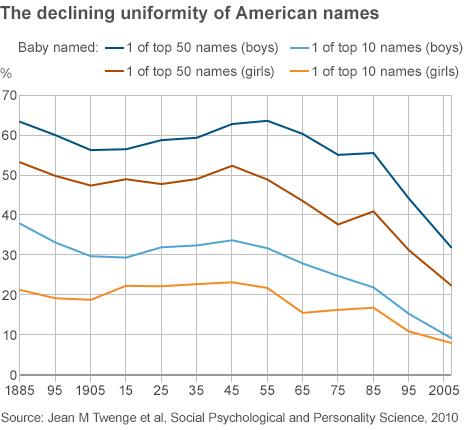Does a baby's name affect its chances in life?
- Published

When parents spend hours poring over baby name books they may imagine that their choice will have a major impact on their child's life. But do names make a difference? Two recent books put this idea under the microscope.
Choosing a name for a child is complicated. Not only should it sound right with the family name but future nicknames - good and bad - need to be taken into consideration. A name might honour a favourite grandparent, but it will also have a forgotten meaning to be unearthed in books, and dubious modern associations to be checked on Google.
Dalton Conley and his wife, Natalie Jeremijenko, were halfway through this pleasant but painstaking process when their baby girl was born, two months premature.
"We had narrowed down the selections to a bunch of E- names, but we couldn't ultimately decide," says Conley, who lives in New York. "Then we came up with the idea of, 'Let's just constrain the first degree of freedom. Let's just give her the first letter and then she can decide when she's old enough what it stands for.'"
And so, E was born. Now 16, she hasn't yet felt the need to extend her first name. "I think once you're given a name, you get used to it - it's part of you," she says. E's little brother, meanwhile, Yo Xing Heyno Augustus Eisner Alexander Weiser Knuckles, did take up his parents' offer to change his name. He added the Heyno and Knuckles when he was four, and his parents made the changes official.

E Harper Nora, Dalton and Yo Xing Heyno Augustus Eisner Alexander Weiser Knuckles Conley
"I have been called a child abuser online," says Dalton Conley, the author of Parentology: Everything You Wanted to Know about the Science of Raising Children but Were Too Exhausted to Ask. "I don't think I've saddled them with some horrible burden. They like the fact that they have unique names now."
Over the last 70 years, researchers have tried to gauge the effect on an individual of having an unusual name. It is thought that our identity is partly shaped by the way we are treated by other people - a concept psychologists call the "looking-glass self" - and our name has the potential to colour our interactions with society. Early studies found that men with uncommon first names were more likely to drop out of school and be lonely later in life. One study found that psychiatric patients with more unusual names tended to be more disturbed.
But more recent work has presented a mixed picture. Richard Zweigenhaft, a psychologist at Guilford College in the US, pointed out that wealthy, oddly-named Americans are more likely to find themselves in Who's Who. He found no consistent bad effects of having a strange name, but noted that both common and unusual names are sometimes deemed desirable.
Conley, who is a sociologist at New York University, says that children with unusual names may learn impulse control because they may be teased or get used to people asking about their names. "They actually benefit from that experience by learning to control their emotions or their impulses, which is of course a great skill for success."
But for the main part, he says, the effect of a name on its bearer rarely amounts to more than the effect of being raised by parents who would choose such a name.
A similar conclusion is reached by Gregory Clark, the economist behind the book The Son Also Rises: Surnames and the History of Social Mobility. Although the main focus of his research is family names, Clark has looked at first names too - specifically, the names of 14,449 freshmen students attending the elite University of Oxford between 2008-2013. By contrasting the incidence of first names in the Oxford sample with their incidence among the general population (of the same age), he calculated the probability, relative to average, that a person given a particular name would go to Oxford. (For the purposes of his research he excluded students with non-English or Welsh surnames.)
He notes that there are more than three times as many Eleanors at Oxford than we might expect, given the frequency of that first name among girls in the general population, and Peters, Simons and Annas are not far behind. Conversely, there is less than a 30th of the expected number of Jades and an even smaller proportion of Paiges and Shannons. An Eleanor is 100 times more likely to go to Oxford than a Jade.
However, there is no evidence that it's the names causing such a marked discrepancy, rather than other factors they represent, Clark says. Different names are popular among different social classes, and these groups have different opportunities and goals.
"That's something that's emerged in modern England that didn't exist around 1800," he says. When he re-ran his study, but this time looking at students attending Oxford and Cambridge in the early 19th Century, he found the correlation between names and university attendance far less marked. First names simply weren't the social signifiers they are now.
What's happened since then is a move towards unusual, even unique, names. Before 1800, Clark says, four first names referred to half of all English men. In 2012, according to the Office for National Statistics, the top four names (Harry, Oliver, Jack, Charlie) accounted for just 7% of English baby boys (and the picture was much the same in Wales).
Similarly in the US, in 1950, 5% of US parents chose a name for their child that wasn't in the top 1,000 names. In 2012, that figure was up to 27%, external.
As late as the 18th Century, it wasn't uncommon for parents to call multiple children the same name - two Johns for different grandfathers, for example. Now parents increasingly look for unique names or spellings of names. As Jean Twenge points out in her book the Narcissism Epidemic, Jasmine now rubs shoulders in naming lists with Jazmine, Jazmyne, Jazzmin, Jazzmine, Jasmina, Jazmyn, Jasmin, and Jasmyn.
As baby names become a matter of choice rather than tradition, they reveal more about the people doing the choosing. An example of this is the growing ease with which one can guess whether a person in the US is black or white. Roland Fryer and Steven Levitt point out that in California in the years running up to 2003, around 40% of black girls were given names that weren't bestowed on a single white girl in the state.

The implications of this clearer signalling of class and race are striking. In a study from 2003, external, called Are Emily And Greg More Employable Than Lakisha and Jamal? Marianne Bertrand and Sendhil Mullainathan sent nearly 5,000 CVs in response to job advertisements in Chicago and Boston newspapers. The CVs were the same, but half were given fake names that sounded like they belonged to white people, like Emily Walsh or Greg Baker, and the other half were given names that sounded African American, like Lakisha Washington or Jamal Jones. The call-back rate from employers was 50% higher on the "white" names then the "black" names. The effects were noted even for federal contractors with "affirmative action" policies, and companies boasting they were "equal opportunities" employers.
The researchers inferred that employers were using first names to discriminate unfairly against black candidates, perhaps at an unconscious level. Those same prejudices might also come into play at the interviewing stage, but a black applicant called Greg Baker, who receives an invitation to an interview, has at least got his foot in the door.
There is also striking evidence of names triggering different outcomes for schoolchildren.
David Figlio, now at Northwestern University, analysed the scores of some 55,000 children in a school district of Florida, external. Instead of just distinguishing between "white" and "black" names, he codified what aspects of names meant that they were more likely to belong to black children and children from low-income families. This allowed him to create a sliding scale, which went, for example, from Drew to Dwayne to Damarcus to Da'Quan. Figlio found that the further along this scale he went, the worse the school test scores and the less likely the student was to be recommended for the schools' programme for "gifted" students. Strikingly, this held true for brothers within a family, and even - although the sample size was small - for twins. Figlio believes that the fault lies with the expectations of schoolteachers and administrators - at schools with more black teachers, the effects were less marked.
In separate research, external, Figlio used the Florida school data to show that black boys who are given names more common among girls are more likely to develop behavioural problems when they reach puberty. The problems increase significantly when there are girls in the same year group with the same name.
If names do affect their bearers' chance of success, it may not always be because of the reactions they cause in other people (the "looking-glass self"). Psychologists talk about "implicit egotism", the positive feelings we each have about ourselves. Brett Pelham cites the concept in explaining his finding that individuals called Virginia, Mildred, Jack and Philip proliferate in Virginia, Milwaukee, Jacksonville and Philadelphia - he believes they are drawn to live there. Another intriguing 2007 paper, entitled Moniker Maladies, found that people's fondness for the initials of their names could get in the way of success. Leif Nelson and Joseph Simmons analysed almost a century of baseball strikeouts and found that hitters with the initial K had a higher strike-out rate ("K" denotes a strike-out in baseball). They also found that graduate students with the initials C and D had a slightly lower grade point average than A and B students, and A and B applicants to law school were more likely to go to better colleges.
E Conley certainly has a fondness for her own initial - which in her case is her name.
"It's just cool that people, especially my friends, will never look at the letter E in the same way again," she says. But she doesn't seem to think her unusual name has had a profound influence on her life so far. "It's just an interesting experience - I'm really no different than an Elizabeth."
Her father reflects that although his children haven't been teased - as some bearers of unusual names are - part of the reason might be the open-minded character of their school and neighbourhood. "I wouldn't say that names don't matter at all," he says. "But how they matter depends on the context."
The Why Factor is broadcast on the BBC World Service. Listen to the programme about given names or the programme about surnames.
Follow @BBCNewsMagazine, external on Twitter and on Facebook, external